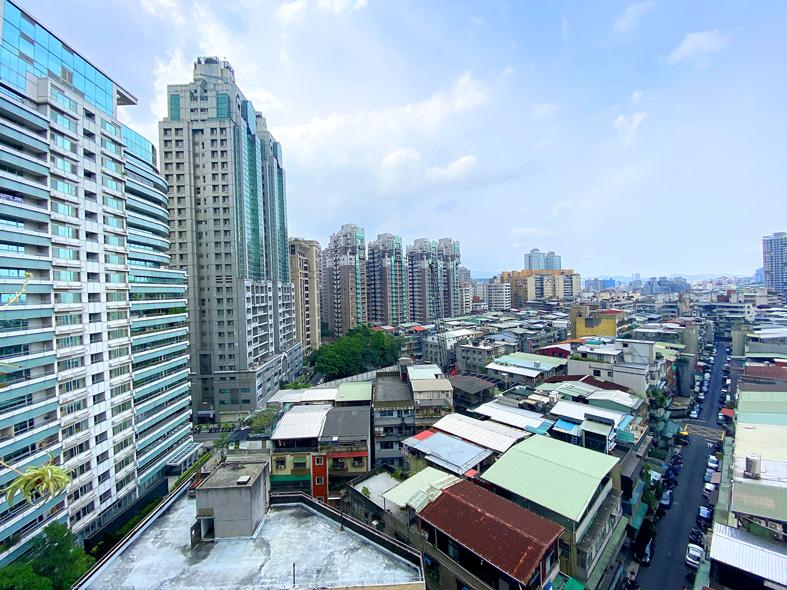The number of unoccupied houses nationwide totaled 876,000 units last year, or 11.94 percent of all houses, the Ministry of the Interior said in a report issued on Thursday.
Almost 30 percent of empty houses were owned by companies, suggesting that many corporate property owners engage in house hoarding, the ministry said.
Excluding developers and builders, companies still owned 20 percent of empty houses, it said.

Photo: CNA
The report is based on housing units’ electricity use and considers properties that use less than 60 kilowatt-hours per month as unoccupied.
The study contradicts Ministry of Finance reports saying that house hoarding subsided and there is no need for housing tax increases.
To rein in property price increases due to house hoarding, the central bank in March capped the loan-to-value ratio at 40 percent for firms and 50 percent for individuals buying their fourth or more.
The interior ministry found that New Taipei City had the highest number of unoccupied houses at 152,000, followed by Kaohsiung with 117,000; Taichung with 105,000; Taoyuan with 102,000; Tainan with 78,000; and Taipei with 68,000.
The report said that 33.47 percent of corporate-owned empty houses were held by companies that owned more than 10 houses.
Individual owners of more than 10 houses held 18.74 percent of all empty houses, it said.
A domestic COVID-19 outbreak in May prompted the central bank to postpone planned measures to rein in house hoarding, even though property and construction lending continued to rise, defying expectations of a downturn.
Separately, Miaoli County-based tile producer Champion Building Materials Co (冠軍建材) yesterday said that it is seeking to reverse losses this year by expanding its domestic market share and booking income from the sale of a production facility in China.
Champion last year incurred losses of NT$403 million (US$14.41 million), or losses per share of NT$0.93, the company told its annual general meeting in Jhunan Township (竹南) on Tuesday, citing sharp competition from low-end producers.
However, the situation might improve this year, as Champion sold an idle production facility in Kunshan, China, amid rising real-estate prices in the emerging high-tech production hub, it said.
The transaction generated NT$1.08 billion in profit, it said.
Revenue contribution from Champion’s China business was 25 percent last year, while the rest came from the domestic market, the company said.

South Korea’s equity benchmark yesterday crossed a new milestone just a month after surpassing the once-unthinkable 5,000 mark as surging global memory demand powers the country’s biggest chipmakers. The KOSPI advanced as much as 2.6 percent to a record 6,123, with Samsung Electronics Co and SK Hynix Inc each gaining more than 2 percent. With the benchmark now up 45 percent this year, South Korea’s stock market capitalization has also moved past France’s, following last month’s overtaking of Germany’s. Long overlooked by foreign funds, despite being undervalued, South Korean stocks have now emerged as clear winners in the global market. The so-called “artificial intelligence

‘SEISMIC SHIFT’: The researcher forecast there would be about 1.1 billion mobile shipments this year, down from 1.26 billion the prior year and erasing years of gains The global smartphone market is expected to contract 12.9 percent this year due to the unprecedented memorychip shortage, marking “a crisis like no other,” researcher International Data Corp (IDC) said. The new forecast, a dramatic revision down from earlier estimates, gives the latest accounting of the ongoing memory crunch that is affecting every corner of the electronics industry. The demand for advanced memory to power artificial intelligence (AI) tasks has drained global supply until well into next year and jeopardizes the business model of many smartphone makers. IDC forecast about 1.1 billion mobile shipments this year, down from 1.26 billion the prior

People stand in a Pokemon store in Tokyo on Thursday. One of the world highest-grossing franchises is celebrated its 30th anniversary yesterday.

Chinese artificial intelligence (AI) start-up DeepSeek’s (深度求索) latest AI model, set to be released as soon as next week, was trained on Nvidia Corp’s most advanced AI chip, the Blackwell, a senior official of US President Donald Trump’s administration said on Monday, in what could represent a violation of US export controls. The US believes DeepSeek will remove the technical indicators that might reveal its use of American AI chips, the official said, adding that the Blackwells are likely clustered at its data center in Inner Mongolia, an autonomous region of China. The person declined to say how the US government received